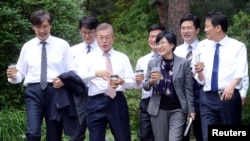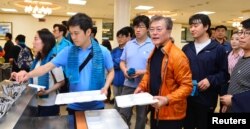He removes his own jacket, brushing off an aide who tried to take it off like a butler. He takes questions from journalists without vetting them first. He gets a $3 lunch with employees at a Blue House cafeteria and tweets about his adopted cats and dogs, who found a new home in the presidential palace.
That may seem unremarkable elsewhere, but newly elected South Korean President Moon Jae-in’s “common man” touch is being feted in a country more used to authoritarian rule by aloof leaders.
High approval ratings
Moon has hit approval ratings not seen in South Korea for nearly a decade by standing in deliberate contrast to his disgraced and impeached predecessor, Park Geun-hye. She was widely reviled for her disconnected style even before the damaging bribery scandal that brought her down in March.
The infatuation may be short-lived if Moon fails to deliver on key election promises that resonated with the public, such as boosting jobs and welfare, reforming powerful family-run conglomerates and easing tensions over North Korea’s fast accelerating weapons programs.
“Naturally, Moon is having a honeymoon period,” said Daniel Tudor, an author of several books on Korean society and politics who briefly advised the Moon campaign. “So far everything Moon has done has shown that he has emotional concern for the average person.”
Moon’s approval rating hit 75 percent, according to polling firm Realmeter. Park’s was at 55 percent in her first week in 2012, before hitting an all-time low of 4 percent in March.
‘Message’ to public
Moon won election with just more than 40 percent of the votes. Much of his popularity among voters and supporters, most of whom are between 20 and 40 years old, was attributed to his down-to-earth and humble demeanor — an image he has maintained since becoming the most powerful person in the country.
Photos of Moon, 64, and his advisers strolling around the grounds of the Blue House presidential office with iced coffees in their hands went viral on social media and ran on major newspapers in Moon’s first few days.
The photos were no accident. Moon himself discussed such photo opportunities with his closest aides, to try to “send a message” that he will continue to communicate with the public, a spokesman for Moon said.
Sensitive to the influence-peddling scandal that brought down Park, Moon has also made a conscious decision to sideline some of his closest friends and advisers.
Yang Jung-chul, one of Moon’s closest aides and an instrumental member of his campaign, wrote in a memo to friends and journalists this week that his dream came true when Moon got elected, and it was now time to leave.
“Let me have the right to be forgotten,” Yang wrote.
Some moments unscripted
Other moments are unscripted. A short clip showing Moon refusing help from an aide with his jacket, which he casually hung on the back of his chair, was a hit on social media, along with pictures of his good-looking bodyguard and some of his cabinet appointments.
Photos of a younger Moon in his days as a special forces soldier wearing a beret and fatigues have been retweeted thousands of times.
He has moved his pets into his official residence, much to the delight of netizens. Tori, a rescue dog, will soon join South Korea’s “First Cat,” who moved into the Blue House this weekend, the Moon spokesman said.
Park left her nine pet dogs behind when she left the Blue House in March after the Constitutional Court upheld a parliamentary impeachment motion against her, drawing criticism from South Korean animal rights activists.
“All Korean presidents end up hated,” Tudor said, referring to the fact that nearly all former presidents, or their family members and key aides, have been embroiled in scandals at the close of their terms or after leaving office. “Moon might at least have a fair chance to buck that trend.”






